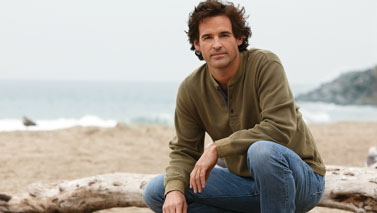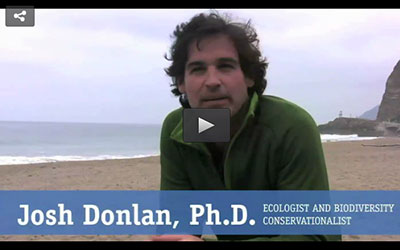Josh Donlan holds a PhD in ecology and evolutionary biology from Cornell University, but he’s not your typical science nerd. The 36-year-old biodiversity conservationist and field ecologist is a seasoned rock climber, former ski bum and unapologetic nomad who describes the years he lived in a yurt — a circular quasi-permanent tent — as “camping with all the luxuries.”
“There is something special and positive about living in a place that is off the grid and sustainable,” says Donlan. “One of my yurts was in the redwoods, with a wrap-around deck, and an outdoor shower and bathtub. That tends to slow your life down somewhat and bring you closer to your environment.”
But that’s not to say Donlan’s your typical tree hugger, either. He first made headlines back in 2005 when he called for the “rewilding” of the United States — reintroducing contemporary versions of exotic large animals (elephants, cheetahs, lions and camels) that freely roamed North America thousands of years ago. The concept, which The New York Times called one of the year’s best ideas, would help to rebuild our country’s biodiversity, Donlan explains, and develop a new generation of naturalists.
“Increasingly, humans are losing their connection with nature and the environment,” he says. “And kids today are obviously much more likely to experience big animals like lions and camels in a zoo or via electronic images from television and computer screens, rather than viewing them in their natural habitats.”
More recently, Donlan’s been stirring up the environmental community with some radical new ideas about how government, the private sector and nonprofits should collaborate to “incentivize” conservation efforts. Founder and executive director of the nonprofit Advanced Conservation Strategies, Donlan says the key to protecting biological diversity is to create solutions that are both incentive-based and cost-effective.
“For a long time, the people in the philanthropic world who were donating to conservation organizations were not demanding accountability — they were simply saying, ‘Here’s a million bucks. Go do something good,’” he explains. “The conservation sector lags way behind the healthcare sector in terms of thinking about the economics of interventions and a return on investments.”
Fortunately, that lax attitude is changing, Donlan says. During the next 10 years he predicts we will see the literal blending of Wall Street and the environmental sector, as the emerging carbon and biodiversity markets begin to attract investors. “We need to move away from the mentality in the West regarding endangered species, which is ‘Shoot, Shovel, Shut Up,’” he says. “If I’m a rancher, I have no incentive to tell you that I have an endangered species on my property. We have to work with the government in developing incentive structures and financial instruments that change that.”
Donlan’s own investment in the natural world began at an early age. Growing up in Virginia Beach, Va., he played in the woods, canoed nearby waterways, went on backpacking trips and learned rock-climbing techniques — spurred on, he says, by “parents who let me do crazy things when I was quite young.”
That inclination continued into his early adult years. He dropped out of college at 18 and fled west — first to Park City, Utah, where he became a “ski bum who largely lived on peanut-butter-and-jelly sandwiches,” and then to Alaska, where he spent two years fishing, kayaking and rock climbing before enrolling at Northern Arizona University in Flagstaff and becoming, as he puts it, “infatuated with biology.”
After graduating, Donlan and his then-girlfriend spent four months kayaking 1,100 miles through the Gulf of California. There he fell in love with islands, a passion that would lead him a few years later to the Galapagos Islands, where he devised a strategy to rid that fragile ecosystem of non-native feral goats as part of the world’s largest island restoration project.
These days, Donlan divides his time between performing that kind of action-oriented ecological restoration around the world and running his nonprofit from a small cabin in Utah’s Wasatch Mountains. As he attempts to balance his fieldwork with his more administrative role, Donlan says his lifestyle choices have become that much more important.
“I’ve always tried to find ways in which I can overlap my lifestyle with my work, and I think I’ve been pretty successful so far,” he says, noting that he can actually ski, mountain bike or trail run right outside his front door.
Sound idyllic? Perhaps. But Donlan says he’s looking forward to the day when he can return to his luxurious yurt.
See the behind-the-scenes footage from our photo shoot with Josh Donlan at experiencelife.lifetime.life/videos.


This Post Has 0 Comments